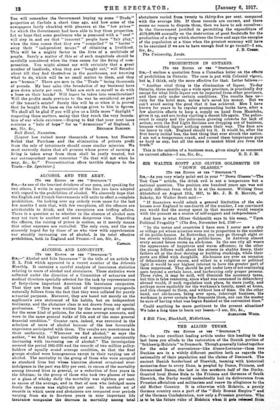SIB WALTER SCOTT AND OLIVER GOLDSMITH ON " DOWN GLASSES."
[To THE EDITOR Or THE " SPECTATON."] SIE.,—As you very wisely point out in your "` Down Glasses'—The Test Case " article, the drink evil is not a temperance but a national question. The position one hundred years ago was not greatly different from what it is at the moment. Writing from Abbotsford on August 11th, 1817, to Mr. J. B. S. Merritt, of Rokeby, Sir Walter Scott said :—
" If financiers would admit a general limitation of the ale- houses over England to one-fourth of the number, I am convinced you would find the money spent in that manner would remain with the peasant as a source of self-support and independence."
And here is what Oliver Goldsmith says in his essay, " Upon Political Frugality " (The Bee, November 9rd, 1759)1— " In the towns and countries I have seen I never saw a city or village yet whose miseries were not in proportion to the number of its public-houses. In Rotterdam you may go through eight or ten streets without finding a public-house. In Antwerp almost every second house seems an ale-house. In the one city all wears the appearance of happiness and warm affluence; in the other the young fellows walk about the streets in shabby finery, their fathers sit at the door darning or knitting stockings, while their ports are filled with dunghills. Ale-houses are ever an occasion of debauchery and excess, and either in a religious or political light it would be our highest interest to have the greater part of them suppressed. They should be put under laws of not continuing open beyond a certain hour, and harbouring only proper persons. These rules, it may be said, will diminish the necessary taxes, but this is false reasoning, since what was consumed in debauchery abroad would, if such regulation took place, be more justly, and perhaps more equitably for the workman's family, spent at home, and this cheaper to them, and without loss of time. On the other hand, our ale-houses, being ever open, interrupt business, the workman is never certain who frequents them, nor can the master be sure of having what was begun finished at the convenient time."
Could anything be more pertinent to the present situation? We take a long time to learn our lesson.—I am, Sir, &c., 6 Hill View, Blackhall, Midlothian. Ameessmine WOOD.










































 Previous page
Previous page